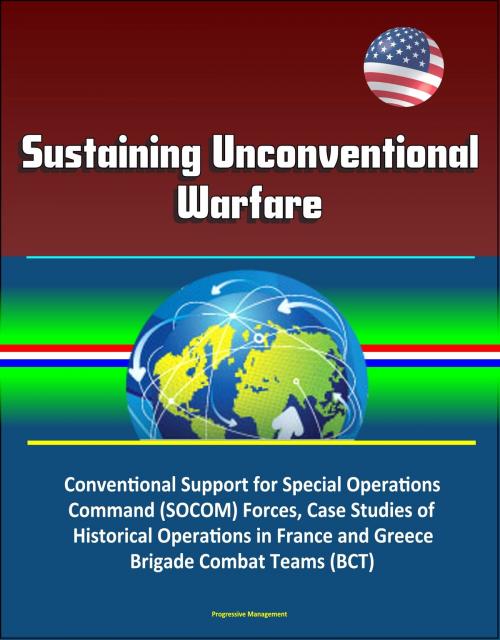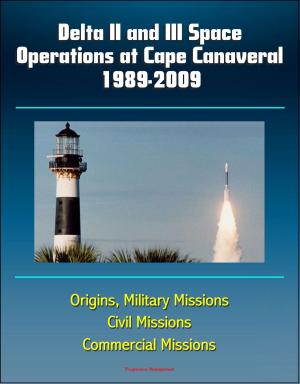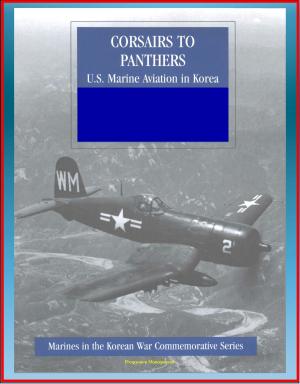Sustaining Unconventional Warfare - Conventional Support for Special Operations Command (SOCOM) Forces, Case Studies of Historical Operations in France and Greece, Brigade Combat Teams (BCT)
Nonfiction, History, Military, United States| Author: | Progressive Management | ISBN: | 9781311366955 |
| Publisher: | Progressive Management | Publication: | July 4, 2016 |
| Imprint: | Smashwords Edition | Language: | English |
| Author: | Progressive Management |
| ISBN: | 9781311366955 |
| Publisher: | Progressive Management |
| Publication: | July 4, 2016 |
| Imprint: | Smashwords Edition |
| Language: | English |
This excellent report has been professionally converted for accurate flowing-text e-book format reproduction. U.S. Special Operations Command (SOCOM) has publicly acknowledged that special operations forces (SOF) require conventional force support. Sustainment is a major component of that required conventional support. Review of the 2009 force design update (FDU) for the Band V Special Forces Group (SFG) shows that Special Forces (SF) operations in Iraq and Afghanistan, as well as the structure of the modular Brigade Combat Team (BCT) influenced the development of the SF Group Support Battalion (GSB) and the SF forward support companies (FSCs). As SF's primary mission, Unconventional Warfare should provide a central, unique, and specific influence in both organizational design and doctrine for all units within the SFG. However, the post-transformation Army's past decade of operations in the contemporary operating environment has influenced the design of the GSB and FSC in ways that do not optimize them for support of SF units conducting UW. One can easily see this influence when comparing the current SF sustainment structure with that of support units involved in the many historical examples of operations that fit the contemporary definition of unconventional warfare.
Three case studies analyzing historical UW operations in France and Greece illustrate common themes in UW sustainment. These themes highlight the shortcomings of the GSB and FSC construct in the Band V FDU by contrasting common characteristics of these organizations with the sustainment units that took part in the historical cases. Each case study bears adequate similarity to UW in the modern context according to the contemporary definition of UW to offer valuable insight. Sustainment operations and organizations are evaluated for economy, integration, and simplicity, three of the Army's principals of sustainment. The evaluation results in recommendations for the GSB and FSC that include limiting expansion of the GSB's common user land transportation (CULT) fleet, increased capability within the support operations (SPO) section, and the capability to coordinate for sustainment support from multiple levels of sustainment providers.
This excellent report has been professionally converted for accurate flowing-text e-book format reproduction. U.S. Special Operations Command (SOCOM) has publicly acknowledged that special operations forces (SOF) require conventional force support. Sustainment is a major component of that required conventional support. Review of the 2009 force design update (FDU) for the Band V Special Forces Group (SFG) shows that Special Forces (SF) operations in Iraq and Afghanistan, as well as the structure of the modular Brigade Combat Team (BCT) influenced the development of the SF Group Support Battalion (GSB) and the SF forward support companies (FSCs). As SF's primary mission, Unconventional Warfare should provide a central, unique, and specific influence in both organizational design and doctrine for all units within the SFG. However, the post-transformation Army's past decade of operations in the contemporary operating environment has influenced the design of the GSB and FSC in ways that do not optimize them for support of SF units conducting UW. One can easily see this influence when comparing the current SF sustainment structure with that of support units involved in the many historical examples of operations that fit the contemporary definition of unconventional warfare.
Three case studies analyzing historical UW operations in France and Greece illustrate common themes in UW sustainment. These themes highlight the shortcomings of the GSB and FSC construct in the Band V FDU by contrasting common characteristics of these organizations with the sustainment units that took part in the historical cases. Each case study bears adequate similarity to UW in the modern context according to the contemporary definition of UW to offer valuable insight. Sustainment operations and organizations are evaluated for economy, integration, and simplicity, three of the Army's principals of sustainment. The evaluation results in recommendations for the GSB and FSC that include limiting expansion of the GSB's common user land transportation (CULT) fleet, increased capability within the support operations (SPO) section, and the capability to coordinate for sustainment support from multiple levels of sustainment providers.















